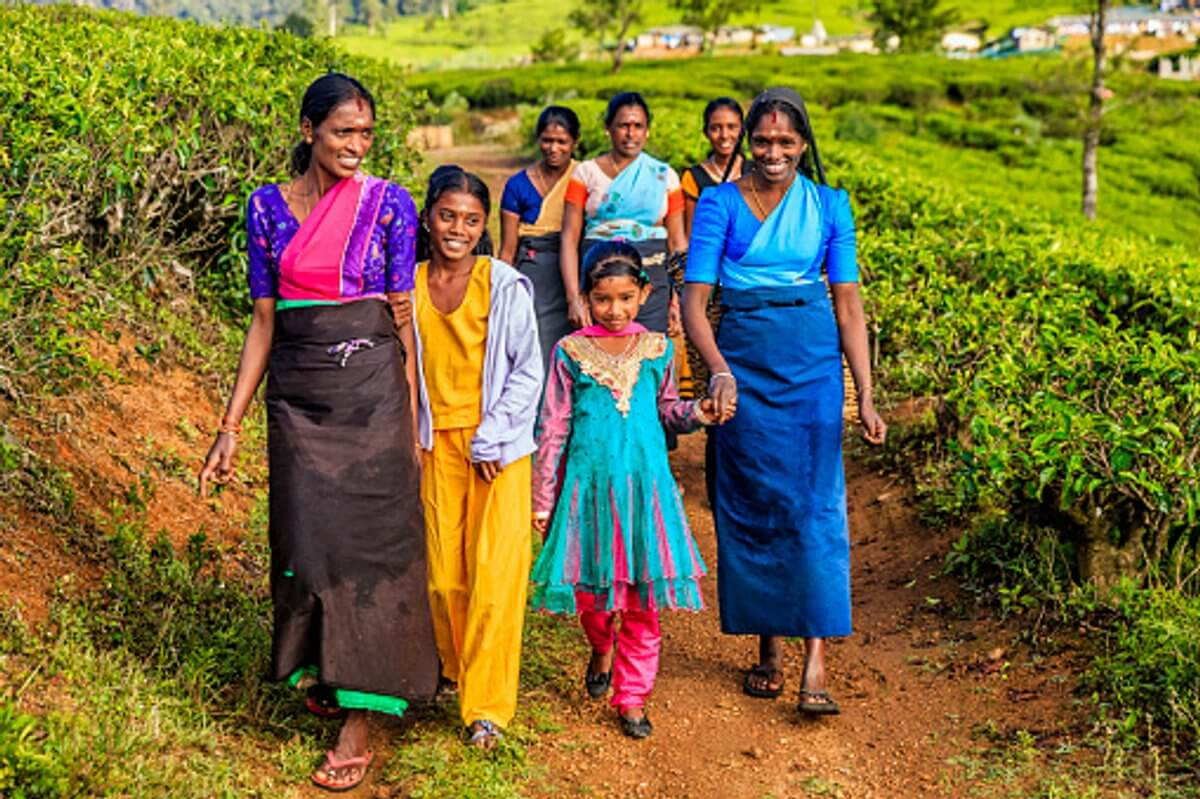This humanitarian association for women’s rights works to improve the position of women in Sri Lankan society, which is still influenced by traditional culture, colonial history, and post-independence politics.
This program aims to provide underprivileged rural women in Sri Lanka with English language skills and life skills to boost their confidence, improve their social interactions, and increase their employment opportunities. It addresses a critical need for their personal and professional development.
Unfortunately, the traditional family model in Sri Lanka rarely benefits women, especially in rural areas. Here, women are still often seen as “dependent wives,” or at best, “supplemental income earners.” Women’s traditional family responsibilities as mothers or wives limit their job choices, as does the attitude of their families and society towards certain types of employment.
In Sri Lanka, most women can read and speak Sinhala and/or Tamil. This is because, in the 1950s, education was made free, and the language of instruction shifted from English to local languages. This change quickly gave women access to education, as parents no longer had to choose between educating their sons or daughters. Female school enrollment rates improved rapidly, and gender disparity significantly decreased from the 1960s. Despite this progress, the dropout rate among girls is very high, especially for those from disadvantaged neighborhoods and remote villages, particularly within rural Muslim communities.
In 1983, the Sri Lankan civil war caused significant social upheaval and trauma. Social sector spending declined, leading to the deterioration of public health and education. Many women were marginalized in precarious situations and unpaid activities. Studies revealed that the condition of women in rural areas worsened over the last 30 years. Women were pushed into unemployment and unskilled jobs. The 2004 tsunami further impacted the labor market in Sri Lanka, as well as the quality of life for women and their families.
Women’s empowerment comes in many forms. Our humanitarian association for women’s rights in Sri Lanka has chosen “English language teaching” to boost women’s confidence and make them more equipped to work and integrate into professional life. The women involved in the project come from underprivileged backgrounds, particularly from Muslim communities, which suffered the most during this recent turbulent period. Many were married off young to start families, at the expense of the careers they dreamed of. Most of them are eager to learn English to ensure their personal development, enhance their self-esteem, and acquire skills for the job market. For many, interacting with our volunteers is a great opportunity to escape their daily routines.
In the afternoons, basic English classes are provided to women in small and medium-sized groups. Sessions take place from Monday to Friday, in the afternoon for 2 hours. Each session is conducted in a friendly atmosphere with small groups of 5 to 20 people. Volunteers are expected to dedicate 1-2 hours per day to preparing for these classes.
Volunteers can seek help from our teams for lesson preparation and delivery methods. However, they will be responsible for lesson planning. Sessions will be held in our teaching center, equipped with tables, chairs, whiteboards, books, and other teaching resources.
English classes focus on oral exchanges with basic grammar concepts. We use various techniques, such as role-playing, to emphasize practical aspects. Ideally, we prefer candidates with teaching experience for this project. However, anyone willing to help and possessing a good command of English can be trained by our teams.
Additionally, participants can opt to join extra teaching sessions in the morning if they wish (subject to availability). These include kindergarten classes or lessons for Buddhist monks. The coordinator of this humanitarian association for women’s rights will discuss these opportunities with volunteers during the introduction phase.
In addition to your project, those who wish can choose to take a one-week tour to explore the best of Sri Lanka’s beauty and diversity. From Galle to Sigiriya, passing through Kandy and Ella, you will discover the southern, central, and western regions of this stunning tropical island.
Please contact us to find out the departure dates.
Tour price: €810.

Duration during the week | Budget total mission |
|---|---|
2 weeks | 1095 € |
3 weeks | 1295 € |
4 weeks | 1495 € |
5 weeks | 1695 € |
6 weeks | 1895 € |
7 weeks | 2095 € |
8 weeks | 2345 € |
9 weeks | 2595 € |
10 weeks | 2845 € |
11 weeks | 3095 € |
12 weeks | 3345 € |
Located on a peaceful hill in the Unawatuna neighborhood (15 minutes by car from the center of Galle), the volunteer house can accommodate a maximum of 48 people. It is spread across three floors with 11 shared rooms, accommodating 4 to 6 individuals per room. When the main house reaches its maximum capacity, additional annexes within a 20km radius are provided for volunteers. Shuttle services are available in the morning and evening for participants to have their meals at the main house and enjoy the pool and garden during their free time.
For couples, families, or individuals seeking privacy, individual, double, and family rooms are available at an additional cost. In case of high demand, it is possible that the house displays complete. In this case, you will stay in the Guesthouse located less than 100m from the house. You will continue to eat all your meals in the main volunteer house and have full access to all its facilities.
A traditional dress code must be followed during the project. Knees and shoulders should be covered, as well as tattoos. It is mandatory to wear the provided blue cotton tunic during the classes. The rest of the clothing can be casual and comfortable.
– Program exclusively for women
– Intermediate level of English (understanding instructions, being able to communicate)
– Copy of passport
| | Merci pour votre abonnement |
